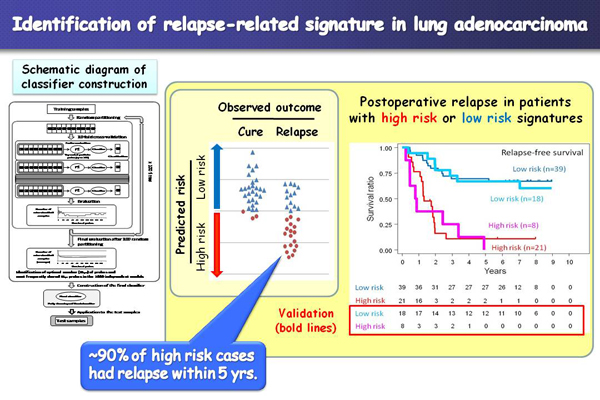▽Research
Genomics approaches for both basic and applied researches
Completion of the human genome project has opened up a new era of ever-increasing discoveries regarding cancer genomes. While the current World Health Organization classification of lung adenocarcinomas is known to be considerably problematic, our expression profiling analysis clearly supports the notion that adenocarcinomas can be classified into two major subtypes with marked genetic and clinicopathologic distinctions, termed terminal respiratory unit (TRU) and non-TRU types. Our efforts directly aimed at translation into clinical usefulness have revealed the existence of an expression signature, which may be consequently utilized to construct a highly accurate classifier of postoperative prognosis for lung adenocarcinoma patients. Such an expression signature appears to be useful for identifying lung cancer patients at very high risk of relapse, even those in an early stage, which may ultimately improve patient prognosis following surgery for this deadly type of cancer. Our integrative approach that combines “wet” and “dry” analyses has also revealed a significant association of perturbations of genes related to the mTOR converging pathways and relapse with death in lung adenocarcinoma patients, which in turn suggests the adaptation of cancer cells to an unfavorable microenvironment as a key in lung cancer progression.
It is becoming increasingly clear that an aberrant transcriptome in cancer cells is not merely reflected in mRNA, but also in miRNA, which represents a specific type of non-coding RNA. Our new direction includes systems biology approaches, in which all possible coding and non-coding RNAs are taken into consideration, in order to obtain a comprehensive picture of the readout of the target cancer genome.

